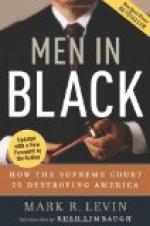Another thing the judge says is that they are not to be governed by sympathy or prejudice in arriving at their verdict. This is a caution that the judge thinks necessary. He forgets that when they are in the jury-room, with locked doors and no one to disturb them, they are going to do exactly as they are inclined. Prejudice and sympathy are for unintelligent people who do not know what they are about. Both lawyers have been telling the jury what intelligent men they were and it seems unnecessary for the judge to say that they are not to be governed by prejudice and sympathy. Suppose the defendant is a rich corporation, they are not going to find against it because it is rich. The company can stand the loss of a few dollars out of its pocket better than the poor man anyway. Not that they are going to decide for that reason.
As these accumulating evidences of the judge’s misunderstanding of their attitude of mind pile up, the jury sink back into their seats. After all, the charge of the judge is not more understandable than most of the other parts of the trial. The saving point about it is that the end is drawing near and they can soon get away and have a smoke in the jury-room, and afterwards go home.
The judge, while he is charging, understands a little of what has been going on in the jury’s mind. He has seen the gleam of interest which was in the jury’s eyes at the beginning gradually die out. He notices how they fall into resigned attitudes. He has a glimmering that the good old legal aphorisms which he has been enunciating with such care about the burden of proof, the weight of evidence, the credibility of witnesses and the caution about sympathy and prejudice, are not very convincing to the jury. But the conventions require that he must go on.
“Gentlemen,” he says, “I must instruct you to eliminate from your minds any discussion of counsel upon questions of law or rulings of the court upon the rejections of testimony, or decisions upon motions to dismiss or direct. They involve matters of law with which you are not at present concerned. In arriving at your verdict you are to consider only the evidence.”
Perhaps the judge feels a trifle foolish and therefore he becomes more emphatic and solemn. He carefully and in a painstaking manner defines the law of negligence. He tells them the law of negligence involves two cardinal principles. “The first is that the plaintiff must establish that the defendant by its employees was guilty of negligence, that he failed to act as a prudent and careful man; second, that the plaintiff must have shown himself free from contributory negligence; that unless the jury find both of these, that the plaintiff cannot recover.” Then perhaps he interjects a little more about the balance of proof as to these particulars. “If the jury find the plaintiff was negligent and the defendant was negligent, they must find a verdict for the defendant. If they find the plaintiff was not negligent and the




